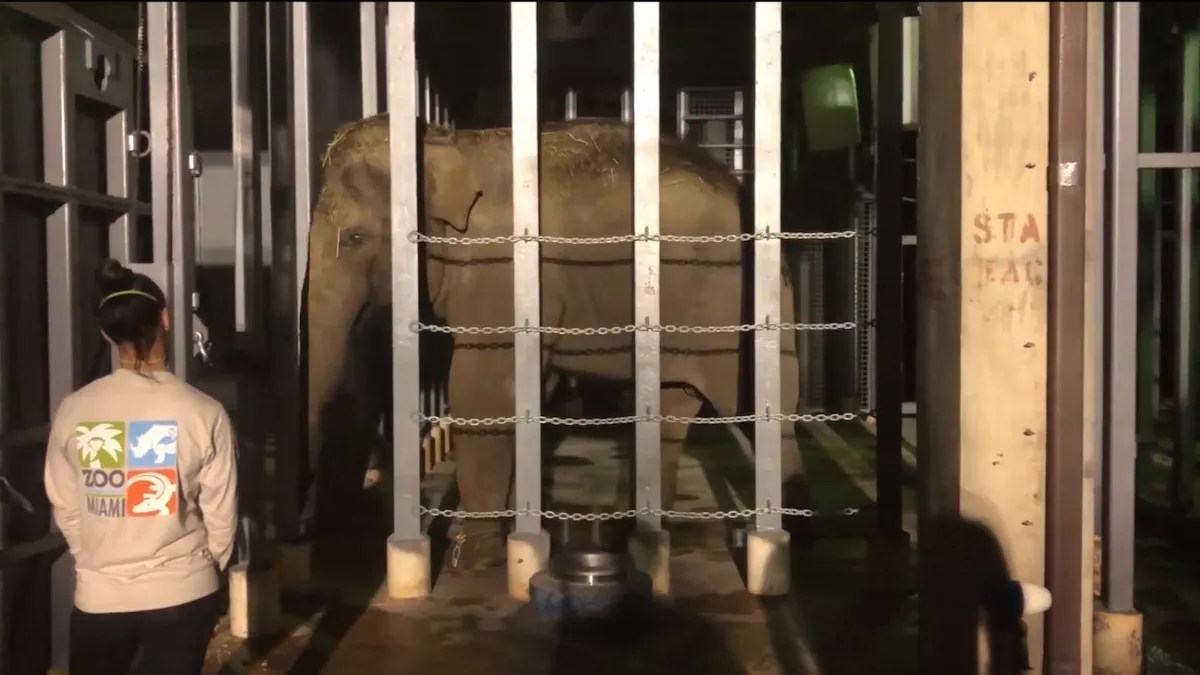
Screenshot via Facebook

Audio By Carbonatix
Back in 2018, Miami welcomed a unique new resident: a 7-year-old Asian elephant named Ongard.
The first male elephant born in Australia’s Melbourne Zoo, Ongard arrived in South Florida on a chartered jet. A handmade banner that read “Welcome to Miami” in colorful Miami Vice-style font greeted the 6,300-pound elephant at Zoo Miami, where he was shipped as part of an endangered species breeding program. The facility was chosen as his new home in part because of its “commitment to caring for elephants.”
But nearly six years after his arrival, Ongard’s living conditions have landed the park on an animal rights group’s list of “Worst Zoos for Elephants in North America.”
In Defense of Animals, an international organization that once shamed Zoo Miami over the death of Cita the elephant, recently bestowed upon the facility a “Dishonorable Mention” on its list of worst zoos for elephants. The report paints a desperate picture of the now 13-year-old Ongard, whom the group claims was ripped from his family as a calf and is “bored crazy” in captivity.
“Everything vital has been taken from Ongard – his family, friends, and any semblance of natural life in the wild. He spends his days walking to and fro in his minuscule enclosure,” says Courtney Scott, an elephant consultant for In Defense of Animals. “We implore Zoo Miami to give Ongard the experience and joy of life as a real elephant in a spacious, diverse, and peaceful sanctuary.”
When Ongard was transported to Florida, Zoo Miami said that he was “incredibly valuable to the captive breeding program” for Asian elephants, of which there are fewer than 50,000 left in the wild. Zoo Miami had arranged the transfer through a breeding loan agreement with Ongard’s owner, San Diego Zoo Global, according to Zoo Miami.
“With an ever-growing threat of habitat loss, human conflict, and poaching, there is a serious concern that we may lose this iconic species in the wild within the next generation,” the Miami park said upon Ongard’s arrival. “Zoo Miami is committed to working with the Association of Zoos and Aquariums (AZA) and the Asian elephant Species Survival Plan to help ensure the survival of these majestic animals for generations to come.”
However, In Defense of Animals argues that there is no such thing as “natural” elephant mating at zoos.
“Zoos shuffle bull elephants around the country like chess pieces with the hope they will mate with females,” the group says on its website. “These transfers are terribly cruel and exploitative, as the males’ welfare and vital social bonds are disregarded when they are treated as living ‘vessels’ of sperm.”
Ongard has been seen in his Miami enclosure swinging his trunk wildly, which is not only a sign of boredom but also acute stress and psychological damage, the group claims.
It also says that the elephant endures “frequent invasive anal procedures to extract sperm,” which is then used for artificial insemination of young female elephants at other zoos, sometimes at an age before they would naturally mate in the wild.
Backlash from animal rights groups has been brewing over Ongard’s presence at Zoo Miami ever since he stepped foot in the U.S.
In May 2018, PETA asserted that because elephants “rarely breed naturally in captivity,” Ongard would be subjected to distressing breeding procedures, during which sperm is taken either via rectal massage or electro-ejaculation (AKA when “a probe is inserted through the rectum and into the lower intestine and used to send a jolt of electricity into the elephant’s body.”)
“During both processes, the animal is either restrained, sedated, or anesthetized,” PETA said.
In a statement to New Times, Zoo Miami spokesperson Tina Furniss-Roe says that Zoo Miami was carefully selected as the most suitable home for Ongard, given that South Florida’s warm, humid climate is similar to the natural environment for Asian elephants.
Ongard is socialized with a female companion elephant and has an entire team of animal care specialists who focus on his interactions and daily enrichment, as well as around-the-clock monitoring by animal health technicians, Furniss-Roe says.
“Through the care and expertise of the Zoo Miami team, Ongard shows no signs of distress or unnatural behavior. He is an important member of the species survival program and an essential ambassador to raise awareness for the plight of the thousands of elephants that are killed illegally every year,” Furniss-Roe says. “Ongard plays a crucial role in education, conservation, and research for his species and inspires people to preserve elephants in the wild.”
Asian elephants have suffered an estimated 50 percent decrease in population over the last three generations, and habitat loss, human encroachment, and poaching have left the long-term survival of the species uncertain. They represent one of three surviving elephant species, along with the African bush elephant and the African forest elephant.
High infant mortality and difficulty in breeding programs have created challenges in maintaining captive Asian elephant populations.
Zoo Miami previously made an appearance on In Defense of Animals’ Worst Zoos for Elephants list in 2019 for what the group claimed was the zoo’s “inability to protect elephants from acts of aggression by other elephants.”
In 2019, an African elephant at Zoo Miami tried to assert her dominance and knocked down another elephant, Cita, leading to the latter’s death. The organization also said that medical records showed Cita had been attacked by the same elephant, Peggy, on at least four other occasions.